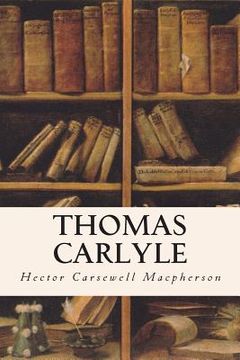Synopsis "Thomas Carlyle (in English)"
Thomas Carlyle (4 December 1795 - 5 February 1881) was a Scottish philosopher, satirical writer, essayist, translator, historian, mathematician, and teacher. Considered one of the most important social commentators of his time, he presented many lectures during his lifetime with certain acclaim in the Victorian era. One of those conferences resulted in his famous work On Heroes, Hero-Worship, and The Heroic in History where he explains that the key role in history lies in the actions of the "Great Man", claiming that "History is nothing but the biography of the Great Man". A respected historian, his 1837 book The French Revolution: A History was the inspiration for Charles Dickens' 1859 novel A Tale of Two Cities, and remains popular today. Carlyle's 1836 Sartor Resartus is a notable philosophical novel. A great polemicist, Carlyle coined the term "the dismal science" for economics.[3] He also wrote articles for the Edinburgh Encyclop dia, [4] and his Occasional Discourse on the Negro Question (1849) remains controversial.[5] Once a Christian, Carlyle lost his faith while attending the University of Edinburgh, later adopting a form of deism.[6] In mathematics, he is known for the Carlyle circle, [7] a method used in quadratic equations and for developing ruler-and-compass constructions of regular polygons. Carlyle was born in Ecclefechan in Dumfriesshire.[5] His parents determinedly afforded him an education at Annan Academy, Annan, where he was bullied and tormented so much that he left after three years.[8] His father was a member of the Burgher secession church.[9] In early life, his family's (and nation's) strong Calvinist beliefs powerfully influenced the young man. After attending the University of Edinburgh, Carlyle became a mathematics teacher, [5] first in Annan and then in Kirkcaldy, where he became close friends with the mystic Edward Irving. (Confusingly, there is another Scottish Thomas Carlyle, born a few years later, connected to Irving via work with the Catholic Apostolic Church.[10]) In 1819-1821, Carlyle returned to the University of Edinburgh, where he suffered an intense crisis of faith and a conversion, which provided the material for Sartor Resartus ("The Tailor Retailored"), which first brought him to the public's notice. Carlyle developed a painful stomach ailment, possibly gastric ulcers, [11] that remained throughout his life and likely contributed to his reputation as a crotchety, argumentative, somewhat disagreeable personality. His prose style, famously cranky and occasionally savage, helped cement an air of irascibility.[12] Carlyle's home at 4 (now 33) Ampton Street, London, marked with a plaque by the London County Council Carlyle's thinking became heavily influenced by German idealism, in particular the work of Johann Gottlieb Fichte. He established himself as an expert on German literature in a series of essays for Fraser's Magazine, and by translating German works, notably Goethe's novel Wilhelm Meisters Lehrjahre.[5] He also wrote a Life of Schiller (1825).[5] In 1826, Thomas Carlyle married fellow intellectual Jane Baillie Welsh, whom he had met through Edmund Irving during his period of German studies.[5] In 1827, he applied for the Chair of Moral Philosophy at St Andrews University but was not appointed.[13] A residence provided by Jane's estate was a house on Craigenputtock, a farm in Dumfrieshire, Scotland.[5] He often wrote about his life at Craigenputtock - in particular: "It is certain that for living and thinking in I have never since found in the world a place so favourable." Here Carlyle wrote some of his most distinguished essays, and began a lifelong friendship with the American essayist Ralph Waldo Emerson.

